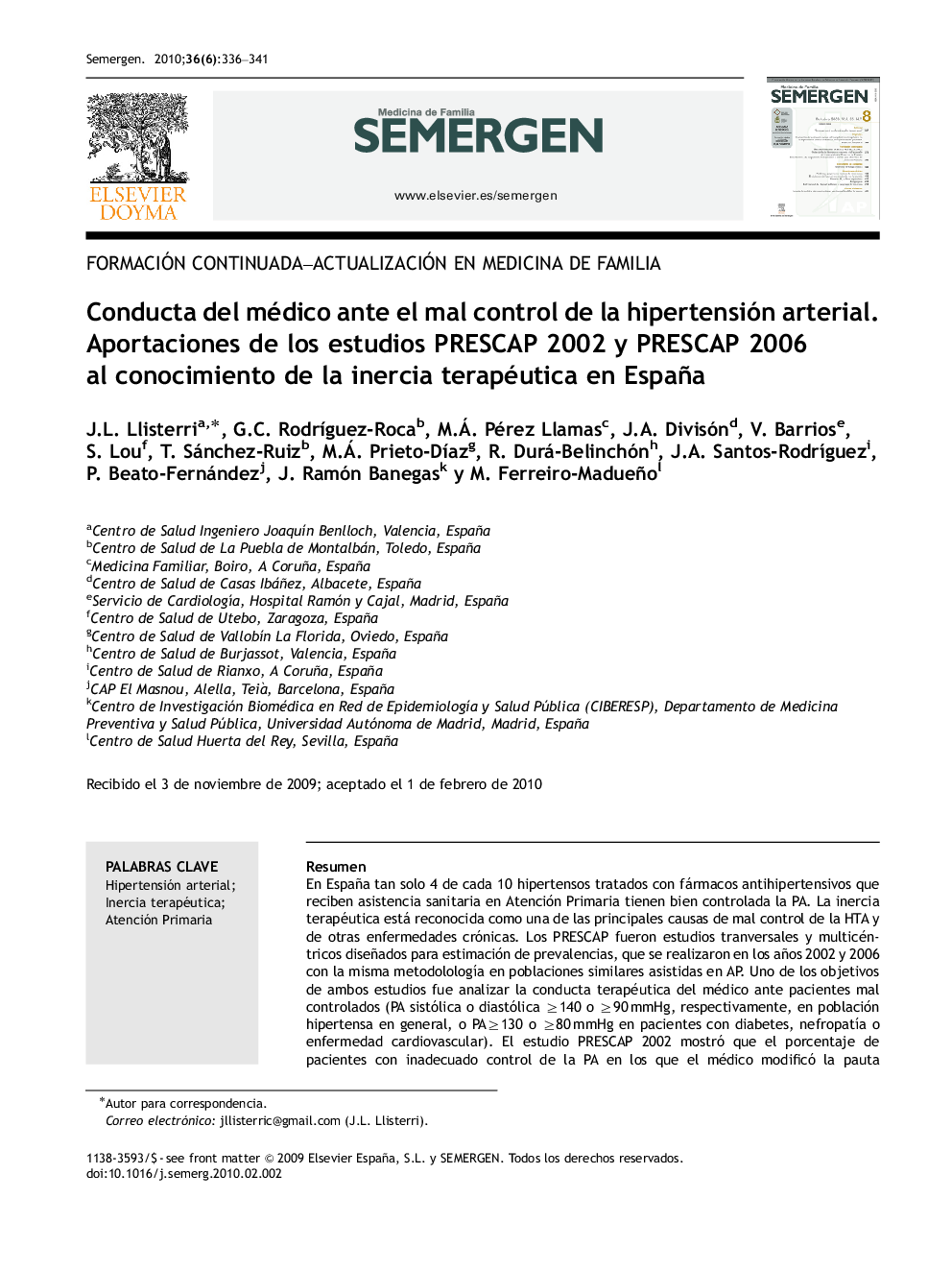| کد مقاله | کد نشریه | سال انتشار | مقاله انگلیسی | نسخه تمام متن |
|---|---|---|---|---|
| 3835664 | 1247393 | 2010 | 6 صفحه PDF | دانلود رایگان |
عنوان انگلیسی مقاله ISI
Conducta del médico ante el mal control de la hipertensión arterial. Aportaciones de los estudios PRESCAP 2002 y PRESCAP 2006 al conocimiento de la inercia terapéutica en España
دانلود مقاله + سفارش ترجمه
دانلود مقاله ISI انگلیسی
رایگان برای ایرانیان
کلمات کلیدی
موضوعات مرتبط
علوم پزشکی و سلامت
پزشکی و دندانپزشکی
پزشکی و دندانپزشکی (عمومی)
پیش نمایش صفحه اول مقاله

چکیده انگلیسی
In Spain, only 4 out of 10 hypertensive patients treated with antihypertensive drugs who are attended in Primary Care (PC) have well-controlled blood pressure (BP). Therapeutic inertia (TI) is recognized as one of the main causes for poorly controlled arterial hypertension and other chronic diseases. The PRESCAPs were cross-sectional and multicenter studies designed to calculate prevalence. These studies were conducted in the years 2002 and 2006 using the same methodology in similar populations attended in PC. One of the purposes of both studies was to analyze the therapeutic attitude of the physician in regards to poorly-controlled patients (systolic or diastolic BPâ¥140 or â¥90 mmHg, respectively, in hypertensive population in general, or BP PAâ¥130 or â¥80 mmHg in patients with diabetes, nephropathy or cardiovascular disease). The PRESCAP 2002 study showed that the percentage of patients with inadequate control of PB in whom the physician changed the therapeutic regime was 18.3% (95% CI: 17.5-19.1), the change in the drug of choice being the action chosen the most (47%), followed by combination (34.7%) and dose increase (18.3%). In the PRESCAP 2006 study, the physician modified the treatment in 30.4% (95% CI: 29.2-31.6) of the poorly controlled subjects. The most frequently performed actions were combination with another drug (46.3%), dose increase (26.1%) and substitution of the antihypertensive drug (22.8%). Perception of good control of BP by the physician was the variable that was most related with the non-modification of the drug treatment. Although the therapeutic attitude of the physician is far from being the best, our results seem to indicate that there has been an important improvement in the therapeutic inertia of the primary care physicians in regards to poorly controlled hypertensive patients who follow a treatment with antihypertensive drugs.
ناشر
Database: Elsevier - ScienceDirect (ساینس دایرکت)
Journal: SEMERGEN - Medicina de Familia - Volume 36, Issue 6, JuneâJuly 2010, Pages 336-341
Journal: SEMERGEN - Medicina de Familia - Volume 36, Issue 6, JuneâJuly 2010, Pages 336-341
نویسندگان
J.L. Llisterri, G.C. RodrÃguez-Roca, M.Á. Pérez Llamas, J.A. Divisón, V. Barrios, S. Lou, T. Sánchez-Ruiz, M.Á. Prieto-DÃaz, R. Durá-Belinchón, J.A. Santos-RodrÃguez, P. Beato-Fernández, J. Ramón Banegas, M. Ferreiro-Madueño,